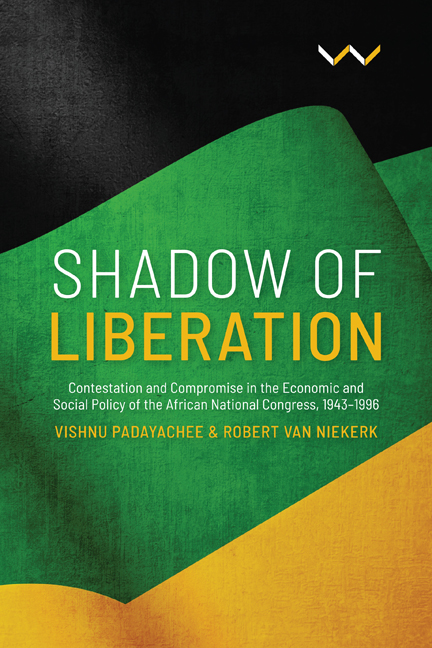 Shadow of Liberation
Shadow of Liberation Book contents
- Frontmatter
- Contents
- Acronyms and abbreviations
- Preface
- Acknowledgements
- Chapter 1 The Context of Economic and Social Policy-Making in the ANC
- Chapter 2 African Claims, the Freedom Charter and Social Democracy, 1943–1960
- Chapter 3 Incarceration, Exile and Homecoming, c.1960–c.1991
- Chapter 4 Economic Policy Debates during a Decade of Liberation, 1985–1993
- Chapter 5 On the Way to GEAR, 1994–1996
- Chapter 6 Making Sense of the Economic Policy Debates
- Chapter 7 South African Reserve Bank Independence
- Chapter 8 The Politics of Health Policy-Making in the Transition Era, 1990–1996
- Chapter 9 Interpretation and Conclusion
- Notes
- Bibliography
- Index
Chapter 5 - On the Way to GEAR, 1994–1996
Published online by Cambridge University Press: 20 January 2022
- Frontmatter
- Contents
- Acronyms and abbreviations
- Preface
- Acknowledgements
- Chapter 1 The Context of Economic and Social Policy-Making in the ANC
- Chapter 2 African Claims, the Freedom Charter and Social Democracy, 1943–1960
- Chapter 3 Incarceration, Exile and Homecoming, c.1960–c.1991
- Chapter 4 Economic Policy Debates during a Decade of Liberation, 1985–1993
- Chapter 5 On the Way to GEAR, 1994–1996
- Chapter 6 Making Sense of the Economic Policy Debates
- Chapter 7 South African Reserve Bank Independence
- Chapter 8 The Politics of Health Policy-Making in the Transition Era, 1990–1996
- Chapter 9 Interpretation and Conclusion
- Notes
- Bibliography
- Index
Summary
READY TO GOVERN
Surprisingly little is known about an important and official ANC document that addressed economic policy. This was the Ready to Govern (RTG) document approved at the ANC's May 1992 policy conference. In order to make more sense of the path to the ANC-led government's Growth, Employment and Redistribution (GEAR) programme in 1996, we need to backtrack a little in time to the 1992 policy document. Tito Mboweni makes no reference to RTG in his paper on formulating policy for a democratic South Africa, though he does observe that ‘formulating economic policy has been one of the most difficult and challenging tasks confronting the democratic forces’ (Mboweni 1994: 69). This echoes a comment he made in a letter to the Macroeconomic Research Group (MERG) director, Vella Pillay, in November 1993 (Letter in Vishnu Padayachee private archive).
In late May 1992, the document that came to be titled Ready to Govern was debated and adopted by the ANC. A section of the document was labelled ‘Economic Policy’. An economics commission attended by about 100 delegates (including Mboweni, Alec Erwin and Ben Turok) gave careful attention to a draft document entitled ‘The Growth Path for the New South Africa’, prepared by Mboweni. A vigorous debate ensued about matters centred around the absence of the word ‘development’ in the title of the paper (Turok 2003: 261) and about nationalisation and privatisation. Nelson Mandela himself entered the debate, warning the conference that nationalisation would meet much opposition in the West. Turok claims he opposed any attempts to rule out the option of public ownership, and the matter was only resolved after the conference ended with a watered-down commitment to the public sector’s role within a mixed economy (Turok 2003: 262). Neverthless, it would appear as if RTG was the first official policy document adopted at a full conference by the ANC since the adoption of the Freedom Charter in 1956. For this reason, its significance cannot be underestimated, though its contents were rather vague and its line some-what populist. RTG was essentially an ANC document, driven by the Department of Economic Planning (DEP), and in which the Congress of South African Trade Unions (Cosatu), the South African Communist Party (SACP) and South African National Civic Organisation (Sanco) were more minor players.
- Type
- Chapter
- Information
- Shadow of LiberationContestation and Compromise in the Economic and Social Policy of the African National Congress, 1943–1996, pp. 109 - 142Publisher: Wits University PressPrint publication year: 2019


